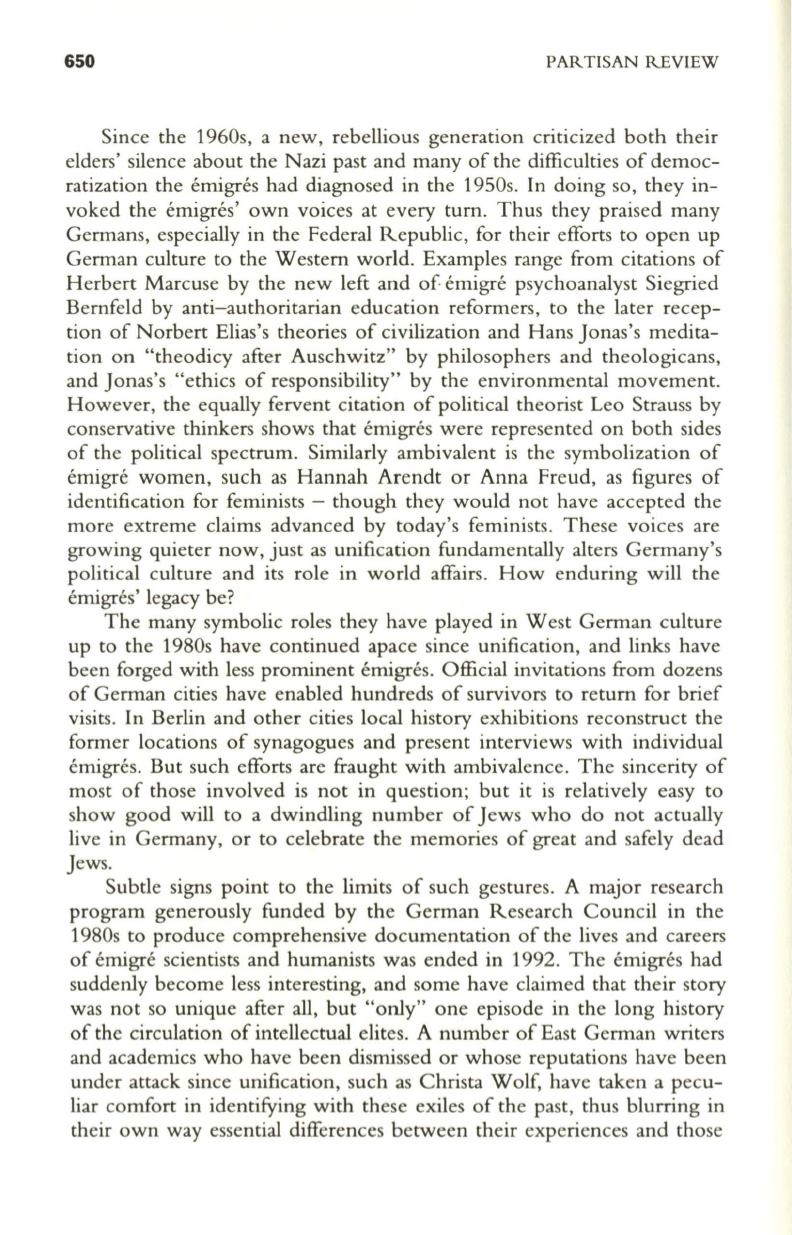
650
PARTISAN REVIEW
Since the 1960s, a new, rebellious generation criticized both their
elders' silence about the Nazi past and many of the difficulties of democ–
ratization the emigres had diagnosed in the 1950s. In doing so, they in–
voked the emigres' own voices at every tum. Thus they praised many
Germans, especially in the Federal Republic, for their efforts to open up
German culture to the Western world. Examples range from citations of
Herbert Marcuse by the new left and of emigre psychoanalyst Siegried
Bernfeld by anti-authoritarian education reformers, to the later recep–
tion of Norbert Elias's theories of civilization and Hans Jonas's medita–
tion on "theodicy after Auschwitz" by philosophers and theologicans,
and Jonas's "ethics of responsibility" by the environmental movement.
However, the equally fervent citation of political theorist Leo Strauss by
conservative thinkers shows that emigres were represented on both sides
of the political spectrum. Similarly ambivalent is the symbolization of
emigre women, such as Hannah Arendt or Anna Freud, as figures of
identification for feminists - though they would not have accepted the
more extreme claims advanced by today's feminists . These voices are
growing quieter now, just as unification fundamentally alters Germany's
political culture and its role in world affairs. How enduring will the
emigres' legacy be?
The many symbolic roles they have played in West German culture
up to the 1980s have continued apace since unification, and links have
been forged with less prominent emigres. Official invitations from dozens
of German cities have enabled hundreds of survivors to return for brief
visits. In Berlin and other cities local history exhibitions reconstruct the
former locations of synagogues and present interviews with individual
emigres. But such efforts are fraught with ambivalence. The sincerity of
most of those involved is not in question; but it is relatively easy to
show good will to a dwindling number of Jews who do not actually
live in Germany, or to celebrate the memories of great and safely dead
Jews.
Subtle signs point to the limits of such gestures. A major research
program generously funded by the German Research Council in the
1980s to produce comprehensive documentation of the lives and careers
of emigre scientists and humanists was ended in 1992. The emigres had
suddenly become less interesting, and some have claimed that their story
was not so unique after all, but
"only"
one episode in the long history
of the circulation of intellectual elites. A number of East German writers
and academics who have been dismissed or whose reputations have been
under attack since unification, such as Christa Wolf, have taken a pecu–
liar comfort in identifYing with these exiles of the past, thus blurring in
their own way essential differences between their experiences and those


